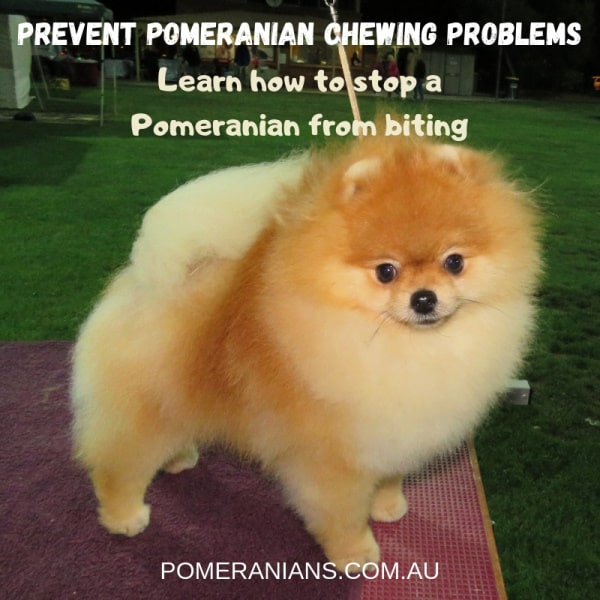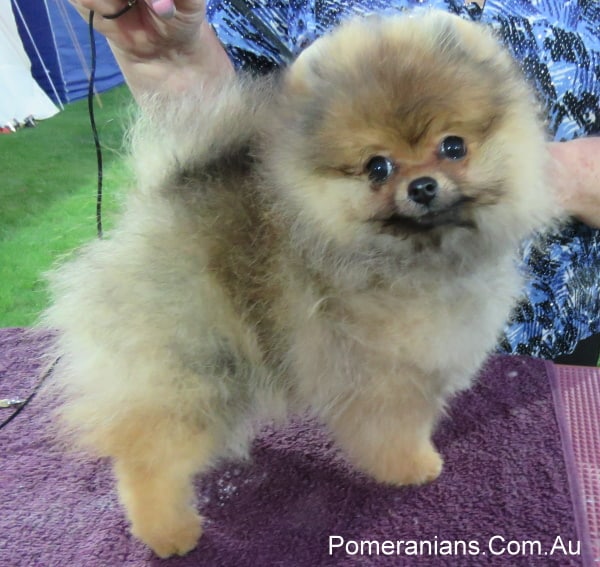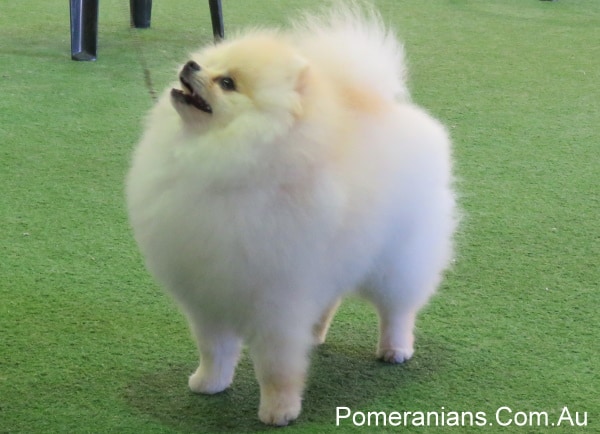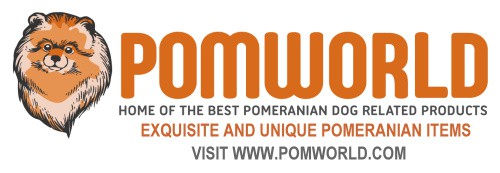Last Updated on September 2, 2020 by Denise Leo

Learn How To Stop a Pomeranian From Biting and How to Prevent Pomeranian Chewing
Some Pomeranians have their owners home all the time. Others have to be on their own if the owner works all day and nobody else is home. In both scenarios, Pomeranian chewing problems and Pomeranian biting are hard habits to break, especially if your puppy is very young.
Dogs and puppies have a bad reputation for destroying books, shoes and almost everything else they find, regardless of whether it’s a toy or one of your expensive shoes. If left unchecked, your new puppy can leave a trail of devastation that’s hard to handle.
The good news is that most breeds of dogs go through different phases including chewing and biting.
These can be seen as separation issues and need to be properly addressed. You can’t simply berate your puppy for doing what comes naturally, until you find a way to train him not to do such things.
Dogs prefer to have human company all the time. If you spend all day at work, it’s natural that he’ll pine and that can result in negative behaviour such as chewing things he shouldn’t. This problem is called separation anxiety. There are ways to train your dog NOT to chew.
Reasons Your Pomeranian Wants to Chew

Apart from separation anxiety, there are other reasons why your Pomeranian may have chewing problems and they include:
- Natural curiosity.
- Teething.
- Nervousness.
- Boredom.
- Feeling lonely.
- Teething.
Dogs are naturally curious about the things around them. The nose and mouth are a dog’s way of learning what things are. Chewing and biting helps them explore different things they find.
Your dog may pick something up, bite it, smell it and shake it so he can learn what it is. It helps him identify toys you have given him and which ones he likes or doesn’t like. It also helps him identify other things are in your home, even things you don’t want him touching.
How to Stop a Pomeranian From Biting and Prevent Pomeranian Chewing Problems
Create a Dog Friendly Home
It’s crucial that you make your home “doggy-friendly.” This means lifting off the ground all potential things he can chew, especially if they’re dangerous items.
This includes shoes, clothing, items on low shelves, low hanging curtains (especially if there are frayed ends he can chew) and electric cords, etc.
Sit on the floor in every room and look around. The view is very different to normal and you’ll find more things to move so they’re not chewed. Remember that while you know what things are and don’t give second thoughts to items such as power cords, your Pomeranian’s eyes, nose and mouth are all close to the ground so he has a very different point of view.
He also has no idea what’s safe and unsafe so he’ll chew almost anything.
Because you love your Pomeranian, you must take every precaution so he doesn’t swallow a button, earring, coin or something sharp that can cause very serious damage. It’s your ongoing job to train him not to chew things within his grasp or sightline.
Regardless of the reason for your dog chewing, one fact is sure: this bad behaviour must be stopped. One aspect of this training is to give your pom safe toys he’ll happily chew on. If you don’t have such safe toys, you better go shopping immediately. You’ll have no chance of preventing him from chewing if you can’t give him things he can safely chew instead.
If your dog doesn’t have safe toys to chew on, he’ll also get frustrated and stressed. This may lead to further health problems and more serious behaviour issues.
Say NO To Your Pomeranian

The single most important word you’ll need to help train your dog is “no!”
This small word is very powerful and is used for housetraining, learning to heel, good behaviour when visitors are present and is also used to stop him chewing unnecessarily.
Saying “no” with no power behind it is a waste of time. Your voice needs to command your dog’s attention immediately so the tone needs to be loud, clear and focused on the bad behaviour he has exhibited.
For example, if your child was about to pick up a hot pan, you would certainly say “no” in a powerful, demanding voice. Training him to not chew will take time and patience.
Having a pet means you’re committed to giving that time whenever required. Your “no” voice must stop your pet from chewing or whatever he’s doing straightaway. If it doesn’t do so, it’s not commanding enough.
There’s no need to yell.
A handy trick to help is to have a spray bottle with warm water and if the “no” doesn’t work on its own, spray your pom and take his attention away from the object and bring it back towards you.
Never chase your dog or play tug-of-war with him while he’s chewing. If you do so, he’ll think you’re playing and will grip even tighter. Always have plenty of chewable toys in stock. Have one in your hand while trying to stop him chewing something he shouldn’t and the idea is to get that object away from him by saying “no” or using the spray bottle and then substituting the toy for the thing he was chewing.
If your dog is teething, you need enough toys so he can chew as much as he needs to. Toys with textured surfaces are ideal or he’ll find substitutes. Teething generally starts at four months and finishes at eight months but some poms bloom later so assess your dog as an individual. Let him lick ice cubes (with added flavouring if needed) to ease teething pain.
Buy lots of toys for him to chew. Don’t give them all to him at once. Only give him a few at a time and you can swap them in and out as required. Some will need repairs so replacing them while you do the repairs is best. Keeping him interested this way really helps.
Praise him when he chews the toys. Say “no” or clap loudly to stop him chewing things that are forbidden. If you arrive home and your pet has chewed or destroyed things he shouldn’t touch, he may have separation anxiety. There are ways to treat minor cases.
Keep him in a pen or gated space to restrict what can be chewed. Don’t greet him the moment you get home. Use the “find” command to make him bring you a chewy toy. When he does, lavish him with praise. That will make him eventually always do this when you get home.
Final Thoughts on Pomeranian Biting and Pomeranian Chewing Problems
Your Pomeranian deserves your love and training him to do the right thing will ensure that you’ll love him for the rest of his life.
Copyright Pomeranians. Com. Au. All Rights Reserved.
References and Further Reading:
[1] Denise Leo “The Pomeranian Handbook”.
[2] Denise Leo “Training Your Pomeranian ”.


